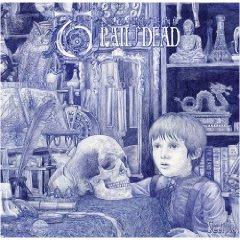 Halcyon Days – …And You Will Know Us By the Trail of Dead
Halcyon Days – …And You Will Know Us By the Trail of Dead
Fields of Coal – …And You Will Know Us By the Trail of Dead
I was first introduced to …And You Will Know Us By the Trail of Dead through their breakthrough 2002 album Source Tags and Codes which famously, and contentiously, was given a perfect 10.0 by Pitchfork. And yes, it might very well have been that good. It crackled with frenetic energy, it pulsated. It was the sound of an entire generation of music tearing itself to shreds. It was violent, but in a way that felt joyful rather than threatening. And it was capped off my the suite of “Relative Ways,” “After the Laughter,” and “Source Tags and Codes” – which remains one of my all-time favorite album closings. Unfortunately, everything since then has left me thoroughly unsatisfied. Until now.
Which is not to say that The Century of Self is anything close to as good as Source Tags and Codes. That would be a bridge too far. It is, however, the first time that I’ve sensed the same sort of forcefulness that burst out of the speakers on that record. I appreciate that they wanted to change things up, but I’m not sure the prog and world music adventures of their past few years served them well. This time around there’s still a LOT of excess – tracks that bleed out past 6 minutes, codas that crackle and hiss, dips and dives through the movements of miniature rock operas – but it’s excess that feels essential, if that makes any kind of sense at all.
The core thing is that, once again, these guys sound like they’re making music that exists for no other reason than to tear everything apart, so that it can be rebuilt from the bottom up, without any of the pretense. Hearts are broken, fields covered in flames, and on the horizon you can see a great dark mass emerging to assert its place.
So sure, this album is overstuffed and some of the songs might be improved by some serious trimming. Absolutely, some of the interludes (particularly “Insatiable One” and “Insatiable Two” – inexplicably packed together at the end) are dull and pointless. And no one could argue that it’s a particularly tight album.
But in spite of all that, there is a magnificent record to be found here in the midst of the madness. It is precisely that madness which sets it free from the vast majority of music, which is “nothing but petty sectarianism, mere rococo of the soul, mere involutions, nooks, queer things, the air of the convectible, not to forget an occasional whiff of bucolic mawkishness…a garrulousness of feeling that almost stupefies; impassioned vehemence, not passion; embarrassing gesticulation.” Instead, this is the sound of Zarathustra, standing astride the world, full of contempt for all those who live their lives of quiet desperation. It is a record that will leap – without fear or concern – full force into the galewinds.
Mistakes are made, but they are noble ones, made in good conscience, and with a will that faces only forward: ready for whatever joyous carnage may be unleashed over the next hill.
